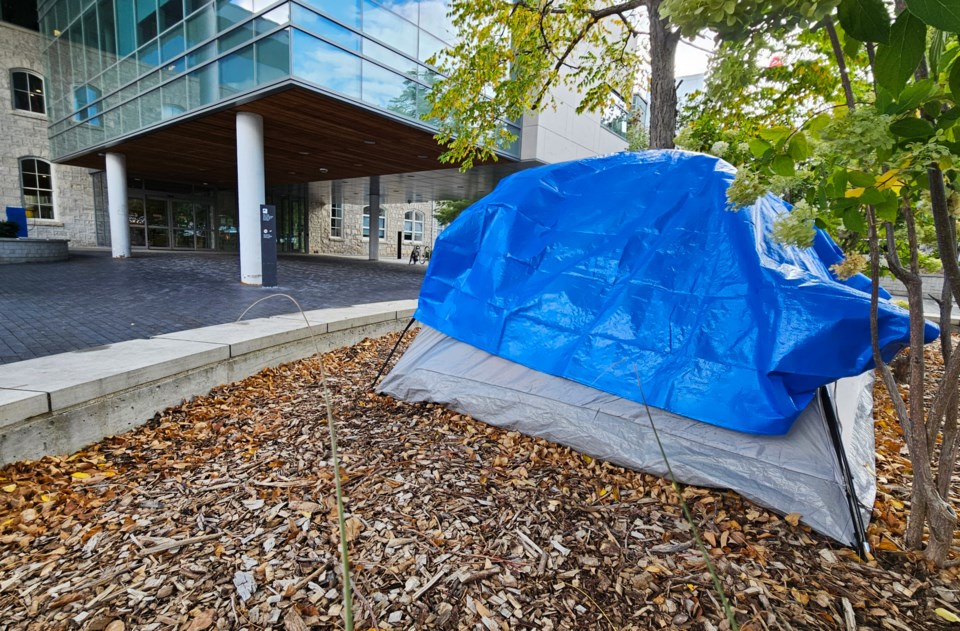The City of Guelph failed to consult with the Accessibility Advisory Committee, or the public in general, on the public space use bylaw that was just approved, after promising to do so.
This came to light during Wednesday night’s special council meeting, when AAC chair Lorelei Root raised concerns the committee was left out of the bylaw discussion both times.
“Some parts of this bylaw would be impossible for certain disabled people to adhere to,” she told council.
“Disabled people experience shelter insecurity and food insecurity at disproportionately high rates compared to other communities,” she added, noting some committee members have lived experience of homelessness as well.
Root said it’s the AAC’s role to remove barriers to accessibility for community members, which includes those living in encampments downtown.
“But realistically, any piece of legislation that is going to restrict how members of the public are permitted to engage with public space should be run by the AAC, because the disabled community is a significant portion of the public, and sometimes we have more specific and less commonly considered needs when it comes to engaging with public spaces.”
She also views it as the committee's role to protect the city from potential human rights complaints and Accessibility for Ontarians with Disabilities Act violations, of which the bylaw has many, she said, adding consulting the AAC on these matters could help avoid legal consequences.
The bylaw was first brought to council on Feb. 14, during which it was deferred.
Root said the AAC was not made aware the bylaw was being crafted, “which was really concerning.”
At its Feb. 20 meeting, the AAC then passed two motions: that it doesn’t support the bylaw or any process that limits the use of public spaces by individuals experiencing lack of shelter, and a request to be involved in any future discussions around processes or bylaws that impact the unhoused, “since it’s a subject that so heavily impacts disabled and chronically ill community members of Guelph.”
While the city isn’t obligated to adhere to the AAC’s recommendations, city staff were present at the meeting and accepted the recommendation, “clearly committed to adhering to it,” she said.
Then-deputy city clerk and now acting-city clerk Dylan McMahon was present for the Feb. 20 meeting, and said there was no set timetable for the bylaw to come back, “nor will it come back in the exact same shape or form that it was presented to council last week.”
He explained it was presented without engagement due to the timelines of council direction – there was simply no time to engage.
While the bylaw was deferred, council directed city staff to launch engagement, which McMahon said “will explicitly include the Accessibility Advisory Committee.”
After engagement that included the AAC, “then, and only then, would an item be going back to city council formally from staff to council for a review.”
“I think you can agree that’s a pretty clear commitment from staff to explicitly include us in engagement before this bylaw would come back to you,” Root said.
But that didn’t happen.
“We have literally not heard a single thing about this from the city since that meeting. There were no emails, no surveys, no requests to join one of the many AAC meetings since then," said Root.
She doesn’t believe the failure to engage was malicious, and said she believes city staff intended to follow through.
“But we were promised a voice in this conversation, and that promise is going unfulfilled. I can’t help but feel any commitment Guelph claims to have toward equity and inclusion should be up for serious scrutiny if you pass a bylaw that directly affects us without hearing our input, after promising us you would.”
During Wednesday’s meeting, deputy CAO Colleen Clack-Bush said the lack of consultation was because when the Kingston appeal was withdrawn in April, staff were instructed to pause all work on the bylaw, including engagement.
“While I can appreciate that six months felt like a long time, we did pause all engagement activities directly, including with the AAC,” she said.
But then the mayor called the special meeting to discuss the bylaw at the end of July.
“That was a very short time period, and we did not have the opportunity to do any re-engagement, either with the AAC or any sort of public engagement process due to the short timeline of this meeting being called,” Clack-Bush said.
She said the intention moving forward is to consult with the AAC during its next meeting in October, at which time the bylaw will be in effect, if confirmed by council on Sept. 10.
Still, Root feels it’s clear the city’s community engagement framework hasn’t been followed, and said passing a bylaw that hasn’t gone through those processes ”would be very irresponsible.”
“I also think that going back on the commitments that have been made by the city to a marginalized community who fought so hard for a voice … would be unethical, and wouldn’t fall in line with the city’s commitment to inclusion.”
Instead of the bylaw, the AAC urged in its motion for the city to “focus on supportive solutions that will create permanent shelter and are not reliant on punitive measures, evictions, or the city determining which areas are permissible to create encampments.”
Root noted there are already laws in place guiding behaviour in public spaces, “and any further limitations imposed on under-housed people will create unnecessary and insurmountable barriers to accessibility in a community that experiences disability at a disproportionate rate.
“Lack of accessibility for unhoused disabled people directly results in the loss of lives, and we have a responsibility to eliminate that problem to the greatest extent that we can.”
